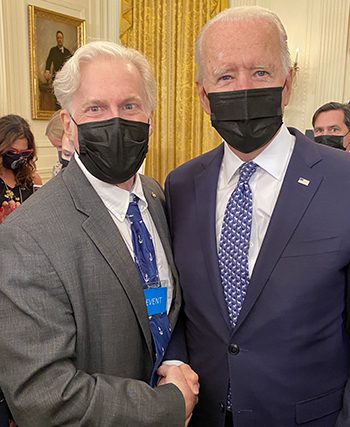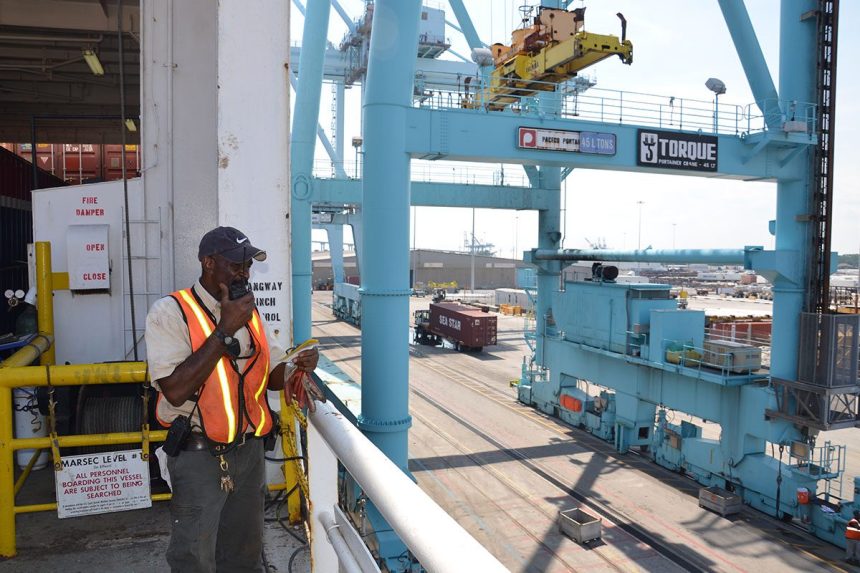
Following several weeks involving congressional testimony and a Maritime Administration (MarAd) announcement, three members of the House of Representatives introduced legislation to strengthen the nation’s cargo preference laws.
US Rep. John Garamendi (D-CA), along with US Reps. Bob Gibbs (R-OH) and Alan Lowenthal (D-CA), submitted the “Rebuilding the United States-Flag International Fleet Act” (HR 9102) on October 3. According to a release, the measure is designed to reverse the decline of US-flag commercial vessels delivering cargo to ports around the world.
“For too long, Congress and both Democratic and Republican presidents have allowed the commercial fleet of US-flagged, ocean-going vessels to dwindle,” stated Garamendi. “The global supply chain crunch during the height of the COVID-19 pandemic, the Russian invasion of Ukraine, and the People’s Republic of China’s island building in the South China Sea and saber-rattling in the Taiwan Strait have shown that the United States cannot remain reliant on foreign vessels flying flags of convenience.
“My comprehensive, bipartisan legislation would help recapitalize the US-flag fleet of ocean-going, commercial vessels by guaranteeing government cargo during peacetime so that US-flag vessels are available during wartime or emergencies,” the congressman added. “The United States has the world’s most capable navy, and we need an equally impressive fleet of commercial cargo vessels crewed by American mariners.”
MTD President Michael Sacco noted, “We in the maritime industry have been calling for action for decades. This is an important first step in rebuilding the US-flag fleet.”
HR 9102 would restore the requirement that was in place between 1985 and 2012 that at least 75 percent for seaborne international food aid programs be moved aboard US-flag bottoms. It would reaffirm that MarAd is the only federal agency able to waive the US-flag requirement for government cargo in those instances when such commercial vessels are not available at fair and reasonable rates. It would strengthen transparency and oversight by requiring public notice online of all waivers of the US-flag requirement and timely notification to Congress. It would clarify that the current US-flag vessel requirement for international food aid applies to all agricultural products and not simply commodity crops.
(During the department’s convention in June, MTD delegates unanimously passed a resolution that “the MTD, its affiliates and its Port Maritime Councils continue to push for strong and effective cargo preference laws… We believe they should be maintained and strengthened, and we stand ready to help spread the word.”)

This legislation comes after Masters, Mates & Pilots President Don Marcus told the House Coast Guard and Maritime Transportation Subcommittee on September 14, “The strict enforcement and enhancement of US-flag cargo preference shipping requirements are essential to providing the base of cargo necessary to sustain US-flag vessels in foreign commerce.”
Marcus, who spoke on behalf of the maritime unions, added, “Without cargo, there are no merchant ships and without US-flag merchant ships, our military and economic independence cannot be sustained.
“American men and women operate US-flag vessels. They do so at all times, and in all conditions: in peace and war, during the pandemic and through all the daily hazards and personal hardships inherent in their occupation. They support their families through employment in good family-wage union jobs,” he informed the legislators.
Later in September, MarAd announced its new efforts aimed at supporting cargo preference requirement compliance by federal agencies.
In a follow-up to the hearing, MarAd said it would issue a request for information to solicit input from all stakeholders on cargo preference requirements and would resume publishing comprehensive federal cargo preference data.
“Cargoes paid for by American taxpayers belong on American ships,” declared Maritime Administrator Ann Phillips. “Cargo preference requirements are not just ‘Buy America’ requirements, they are requirements that also help to strengthen America.”

